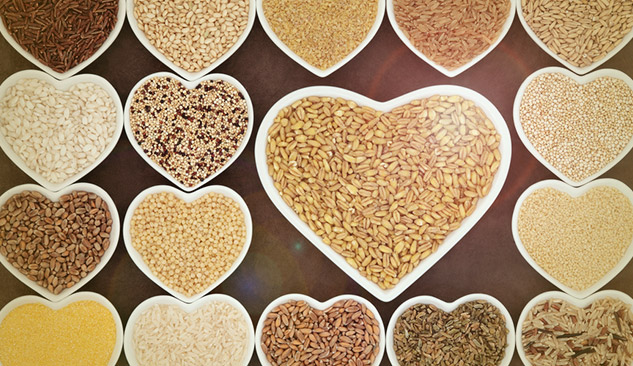What are Macronutrients and why are they good for you?

When we consider the nutritional needs of the body in order to survive and function, we can broadly divide or define the diet into macronutrients (carbohydrate, protein and fat), and micronutrients (vitamins and minerals).
The three macronutrients all have their own specific roles and functions in the body, and all supply us with calories or energy. For this reason, the body requires these nutrients in relatively large amounts to grow, develop and continually thrive. Remember, macro means large!
Micronutrient elements on the other hand, whilst equally crucial, are required in much smaller quantities (micro = small) to ensure normal metabolism, growth and physical and mental wellbeing. Of course we also need water to survive, which serves as a carrier, distributing nutrients to the body’s cells, and removing toxins and waste products for elimination.
Here is what you need to know about macronutrients and why a balanced diet and intake of these vital nutrients are necessary for good health.
Where do we source macronutrients on a plant-based diet?
All foods can be broadly categorised into a protein, a carbohydrate, or a fat-based food, although hardly ever, will a food be 100% one macronutrient, especially in a varied and fresh plant-based diet, instead containing a variety of different proteins and carbohydrates and fats.
Let’s take the example of an avocado – comprised of about 20% carbohydrate, 5% protein and 75% fat. Bananas on the other hand are 95% carbohydrate, with a smattering of protein and fat. Nuts, such as almonds, are rather like avocados, being comprised of about 70% fat, 15% protein, and 15% carbohydrate. This means you are able to gain different types of fuel from just one food.
Nutrition doesn’t always have to be complex or highly scientific. We can easily build a healthy plant-based diet by understanding major macronutrient foods.
Macronutrients ahoy!
Carbohydrates
Carbohydrates are the main energy source for the body. They are made up of chains of small units of sugar that the digestive system can break down relatively easily, and ultimately digest as glucose.
Glucose is essential for the body. It’s the preferred and quickest source of energy for the body’s cells, as well as for the brain. For this reason, your diet ideally needs to contain 45-65% carbohydrates.
Carbohydrates can either be complex or simple in nature. Although both belonging to the same group, they have different impacts on the body:
Complex Carbohydrates
Complex carbohydrates, usually known as the ‘good carbs’ are made up of long strings of sugar units that contain fibre and vitamin B. This helps your body to keep steady glucose levels. It takes longer to break down complex carbs, making them more filling, which also makes them a good option for weight control.
Simple Carbohydrates
Simple carbs are made up of either one of two sugar units that can be broken down fairly quickly in the body. This may therefore not fill you up as long as complex carbs can. Simple carbs have a fleeting impact on blood sugar levels. A few types of simple carbs including candy can cause blood and energy levels to rise and fall quickly, leading to a sugar rush.
Most diets should be built “upwards” from a solid foundation of carbohydrate rich foods. This is easy on a plant-based diet, as carbohydrates are found in the vast majority of natural plant foods. By far the healthiest choices are fresh fruits, vegetables, beans, pulses, legumes, and whole grains. These foods contain plenty of energy, along with fibre and nutrients.
Any well-constructed and considered plant-based diet is high in fibre – a vital component of plant foods. Fibre is the gut’s brush and sweeper, a bulking agent and overall body cleanser! Although fibre cannot be digested by the body, it plays a crucial role in the intestines, expelling waste, providing food for healthy gut bacteria, and helping to maintain healthy cholesterol levels.
Good carbs for a healthy diet:
- Bananas
- Apples
- Mango
- Papaya
- Melon
- Cauliflower
- Squash and zucchini
- Carrots
- Quinoa
- Wholegrain rice
- Wild rice
- Oats
- Millet
The skinny on fats
Despite what you may have heard, fat is an integral part of a healthy diet. It is essential for brain development and function, cellular production, cell regeneration and overall cell functioning.
Another major function of fat in the body is protection, and insulation. Fat helps keep us warm in the winter, and maintain a comfortable body temperature. It is also vital for cushioning and to protect the body’s organs.
Lastly, fat plays a vital role in the absorption of certain fat-soluble vitamins (i.e. vitamins A, D, E, and K) as well as carotenoids found in colourful plant-based foods such as kale, avocado, carrots, watercress and bell peppers.
A healthy diet generally consists of around 15-20% fat, and if you want healthy fat (which of course is the primary aim) the sorts of foods that are naturally fat-rich, taste delicious and are highly versatile are listed below.
Some healthy fat-rich foods are avocado (used in many meals), coconut and coconut oil (for light frying) hempseeds (in salads and smoothies), hemp oil (for salad dressings), almonds, pumpkin seeds, olives (as snacks and in salads), and chia seeds (as a breakfast porridge).
Good fats in your foods
- Avocado (this top food not only has a good balance of carbs, fat and protein, it also contains a wide range of vitamins, minerals, & phytonutrients such as carotenoids and phytosterols)
- Almonds
- Walnuts
- Pumpkin seeds
- Chia seeds
- Coconut flesh and oil
- Olives
- Seed oils
Proteins
Proteins play exclusive and vital roles in the body such as building, and repairing/regenerating body tissues and cells. Undeniably, it is particularly important for physically active individuals whose muscle tissue is constantly being broken down, and in need of repair. Protein has other roles that include the manufacturing of hormones, as well as enzymes used in digestion. Protein is also vital to the healthy functioning of the immune system.
Proteins-based foods are made up of amino acids. Amino acids are linked together in differing levels of complexity, and formation. All in all there are 20 different amino acids, nine of which are considered essential, meaning the body can’t manufacture these naturally. They therefore have to be consumed.
Proteins that contain all 20 amino acids are often called complete proteins, and on a plant-based diet, we need to look to foods such as quinoa, avocado, chia seeds, and hemp seeds for complete protein nourishment.
Protein can make up anywhere from 15-30% of a healthy plant-based diet.
High protein foods to eat:
- Beans, pulses and legumes (even better if sprouted!)
- Seeds (especially hemp seeds, chia seeds and flax seeds)
- Nuts (almonds, walnuts, pecans, cashews)
- Raw greens (kale, spinach)
- Beetroot
- Avocado
- Quinoa
Putting it all together…
Whether you prefer three meals a day, or five smaller meals or snacks, you can’t go wrong by simply dividing a meal into three parts, to ensure that your diet consists of all the macronutrients needed to keep a healthy lifestyle, including a main carbohydrate, a main protein and a naturally fat-rich food. Here are some workable, and practical examples:
- Avocado, quinoa and puy lentil salad
- Chia & almond milk porridge with banana, coconut shavings, mango and pumpkin seeds
- Wild rice and pea salad
- Tofu stir-fry with wholegrain rice
- Spaghetti squash with tomato, olive and basil sauce
If you want to learn more about nutrition, vitamins and minerals, why not read our “What are Micronutrients?” blog post?
Feeling hungry? Buy a TREK Bar today for the ultimate high protein snack to add into your vegan diet.





